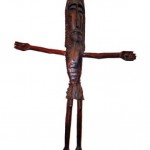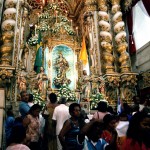- photo by Antonio Neto
- Wood carving by Louco, of Cachoeira, Bahia
- photo by Antonio Neto
Brazil has the largest Roman Catholic population in the world. Three-quarters of Brazil’s 200 million people say they are Catholic, although today Protestants are growing in numbers – many affiliating with new Evangelical congregations.
Pilgrimages and colorful street festivals honoring the feast days of Catholic saints combine both religious and civic celebrations that mark the calendar in both small towns and urban centers throughout the Northeast. Many Catholic festivals and feast days have parallels in the practices and festivals of the African-Brazilian religion, Candomblé.
The Church of Our Lady of the Rosary of the Black People
The Church of Nossa Senhora do Rosario dos Pretos (Our Lady of the Rosary of the Black People) was built by slaves and free blacks in the 18th century just outside the walls of the magnificent colonial capital of Salvador. Legend holds that many of the Blacks who built the Rosario Church by night worked by day on the gold-encrusted interior of rich Church of São Francisco nearby, later shaking the fine flakes of gold leaf that had collected in their hair to decorate the Church of the Rosario.
The Church of the Bonfim
Salvador’s Igreja do Bonfim (Church of the Crucifixion) is a prominent Catholic Church in Bahia with strong appeal to adherents of Candomblé, especially those attached to the orixá, Oxalá. Catholics with a devotion to Oxala frequently attend Mass on Friday, the day of Oxala, dressed in white, the color of Oxala. Multi-colored ribbons, imprinted with the name of the Bonfim, can be seen all over Salvador; knotted on the wrist, they represent prayers to the saints and to the orixas.
Evangelical Faiths
In recent years, new forms of Christianity have entered the northeast of Brazil. Pentecostals as well as traditional Protestants, like Baptists, Presbyterians and Methodists, have brought energy and vitality to the religious life of the region. Small storefront churches illuminate neighborhood streets and the singing of hymns fills once quiet evenings. Some of the largest Pentecostal denominations have reached out to the poor and claim many adherents in slums and favelas



